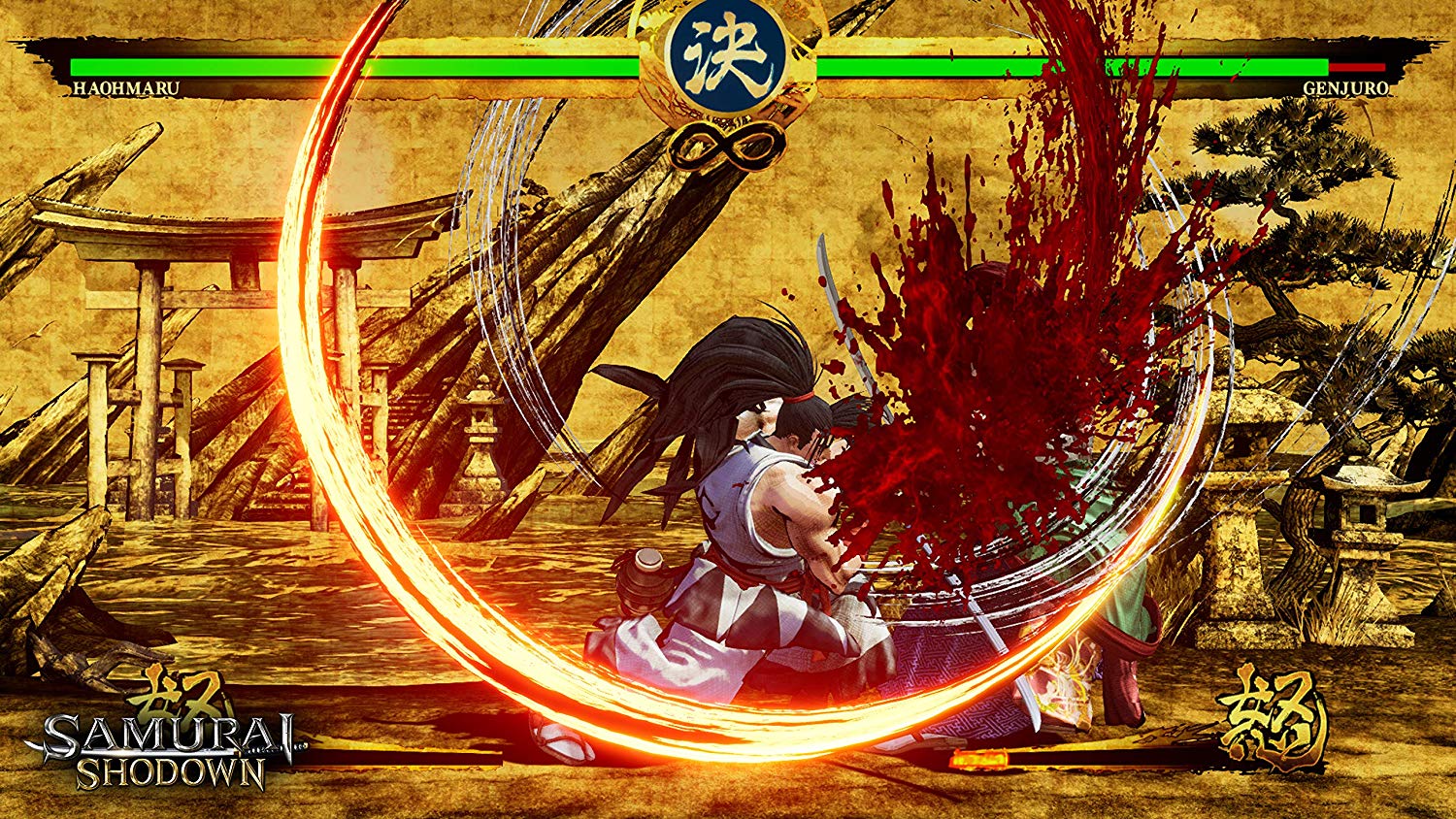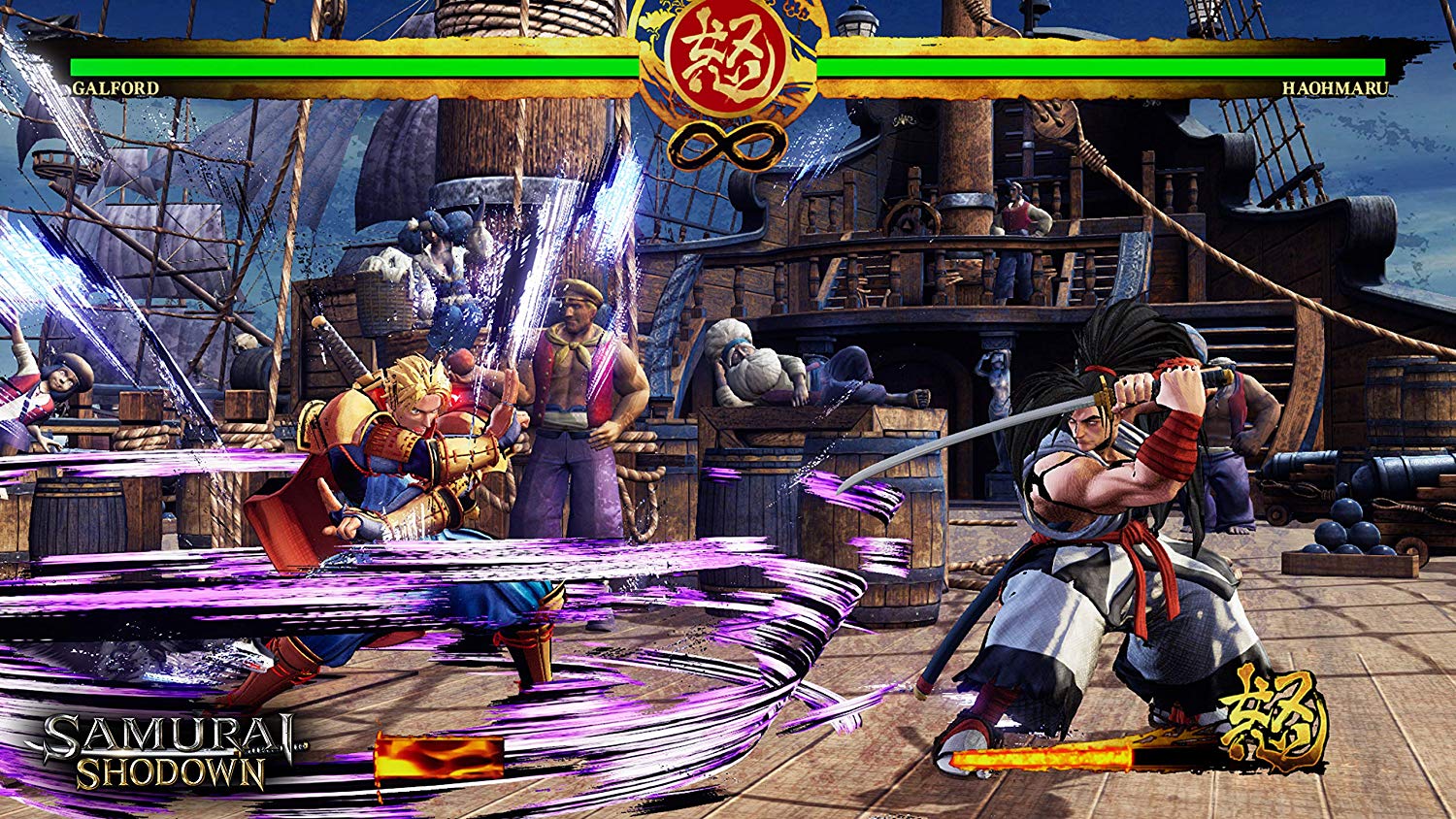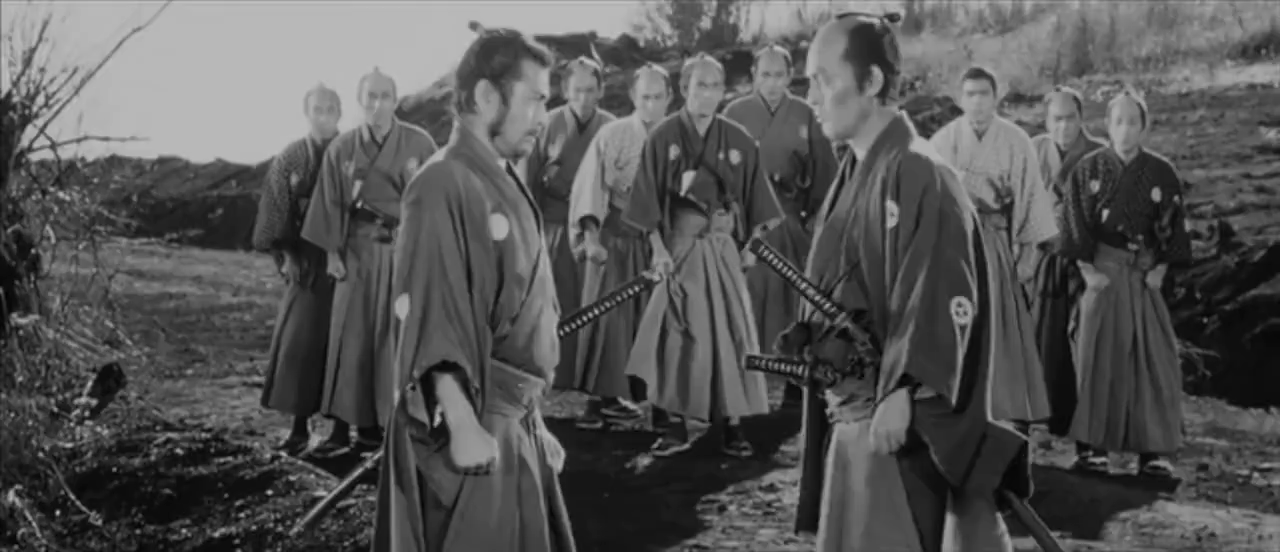Content warning: Blood.
If you have seen the following scene from Sanjuro (1962) in which Toshino Mifune bisects Tatsuya Nakadai, or any of the one hundred thousand shots it influenced across every sword fight in every movie or anime you have ever seen, you are the target audience for Samurai Shodown (2019), a reboot of the series you may remember from the arcade machines of your youth, which featured ubiquitously on SNK’s Neo-Geo hardware.
It may surprise you to learn that Samurai Shodown, which released last last month, is a game about samurai having showdowns. Next week, it will be featured on the main stage at at Evo, the year’s biggest fighting game tournament, right alongside big titles like Street Fighter V, Tekken 7, and Smash Bros. Ultimate. In fact, it has more entrants than big games like Mortal Kombat 11and DragonBall FighterZ).
If you enjoy casually watching fighting games, then that news should excite you. In an era of extremely complicated multi-character games with freeform aerial movement, it is a very clear game to both follow and play. A faithful reboot of a meticulously refined series, Samurai Shodown’s unconventional approaches (both to existing fighting game conventions and to the spelling of the word “showdown”) make it a game that’s uniquely tense, where consequences are severe and pressure is high, and players suddenly explode into action after periods of dead silence.
Samurai Shodown launched to mixed reviews and little fanfare last month, so there's a chance you don't know what makes it so appealing. So: In Samurai Shodown you can be a samurai, or a sort of guy who is close enough to a samurai (like a kabuki actor, or a french duelist, or a ninja, or a white guy from San Francisco who wants to be a ninja), and you can have a showdown with this guy against someone else’s samurai. As a 1v1 fighting game, Samurai Shodown is as simple as it gets while still efficiently replicating the experience of getting slashed in half in a samurai movie, and everything that comes with it: the tense silence while each player waits for the other to make a move, the incredible speed of the actual exchange, and the absurd fountain of blood when the final blow lands.

If realistic in almost no other ways, with its colorful cast of pirates, samurai, American ninja warriors, and French noblewomen, Samurai Shodown is absolutely loyal to the historical and cinematic lethality of being bisected by Toshiro Mifune. SNK’s revival of their classic fighting game is if anything more generous than Akira Kurosawa, because in Samurai Shodown you usually don’t just die in one strike, although it is extremely possible to die in two or three. This is quite a contrast to stylized anime fighting games like Guilty Gear or the photorealistic gore of Mortal Kombat, where being hit with a fireball or stabbed through the eye doesn’t seem to bother anyone terribly.
The difference in how Samurai Shodown approaches being hit very hard with something very sharp is unmistakable from the first time you press the heavy attack button: It will connect with your opponent, because his step forward and slash takes up fully half the screen, and if your opponent is not blocking suddenly they’re almost half dead. Next time you press that button, they block; you reels back from the recoil. Now maybe you’re the one about to be half dead. Or maybe, that’s exactly what you were planning all along: they attack right then, and then you parry, and their sword flies out of their hands. They have to scramble to get it back, except they don’t, because you’re already behind them and they’re gushing blood, and this time, you’re Toshino Mifune. Or maybe instead, they do absolutely nothing, waiting patiently while you parry nothing but thin air, leaving yourself completely exposed, and now you’re the one gushing a comical amount of blood. Life as a samurai is very harsh.

Above, I am doing just about shot for shot what Toshino Mifune does, as my analogue Charlotte, who (like me) happens to be a white girl with an annoying laugh. It really is that precise of a game. It’s impossible to describe how thrilling it is to end a match so immediately and so climatically with that iconic splatter. He knew it was coming, too, he saw me sacrifice pretty much everything I had left just for the chance to Mifune him, and he still made the mistake of leaving an opening. As a person who has watched a lot of anime, I was incredibly, unreasonably pleased with myself.
It’s also a game where you might lose you thirteenth game in a row to someone when you make one little mistake and snatch defeat from the jaws of victory. I am being honest with you: Sometimes you’re not Toshiro Mifune. Sometimes, though, you are! Samurai Shodown is about the parts of fighting games I like (tense exchanges of blows interrupted by immediate bisection) without the parts that I love watching but haven’t had the focus to do, like 4th-dimensional chess setplay, labyrinthine pressure strings, and impossible aerial movement. If you understand ANY of the words the previous sentence, you have already made your decision on whether or not to buy this game.
I have a particular affection for fighting games, especially 2D fighting games, because they’re pretty great at depicting what fighting is like in general, when everything is equal except for skill. Samurai Shodown stands out for its simplicity and the purity of its formula, and how relatively little prior knowledge you need to pick up the game and play.
Fighting games are these wonderfully complex equations of risk and reward and pure mind games that are wonderful and fulfilling to watch, and I am super bad at them. There’s a huge barrier of time and execution that makes it difficult to just pick up and play and experience the thrill without spending hours practicing, so I really appreciate how little friction there is in this particular fighting game between me and the good stuff. The execution is almost exclusively in decision making, and not memorization and muscle memory. Most importantly, it feels like the experience that it is, in a way that makes the stakes crystal clear.
The sickening moment of hitstop and the spray of blood that accompany a heavy attack is so easy to understand. I love the faithful recreation of the effect from the original sprite-based Samurai Shodown, freezing the screen for a moment on every hit, just to make sure you can appreciate how much they hurt. A move that looks exactly like it would leave someone one-third of the way to death does mathematically that much damage. It is as cleanly understandable as the agonizing second of vulnerability if you miss, knowing that you just gave your opponent all the time in the world to do the same. Maybe the most clever thing about Samurai Shodown is pressing those big buttons feels so amazing when they connect you cannot help but want to risk it, even when you know it’s the wrong idea. The rush is too intoxicating to ignore because the payout is too delicious.

Fighting games are so well understood that even tiny changes can make a huge difference in how they play out. There are many quirks to this game, but my personal favorite is their very simple changes to the round timer, one of the last things you might be paying attention to in most other fighting games. A default round of Samurai Shodown lasts exactly one minute, which is an extraordinary small amount amount of time, and noticeably less than most comparable 2D fighters. Even if you have the self-control to not make foolish risks, if you’re bleeding and your opponent isn’t, and the clock is ticking down, you don’t have any choice, you have to make a move. Opponents about to lose from a time out are terrifying, there is almost no one I’d rather fight less. The chaotic desperation of someone with nothing to lose and a button that leaps them across the screen in a flurry of swords and flower petals is not to be underestimated. You can’t count on them to press that button at a time that makes sense. They’re capable of anything.

I personally love watching fighting games maybe even a bit more than I like playing them, for the same reason people like sports, or watching speedruns. Samurai Shodown, like a lot of fighting games, becomes more and more beautiful when it’s played by people who are amazing at it. The last game in the series (that was well regarded) was Samurai Shodown 5 Special, the Neo-Geo’s last game, a swan song for SNK’s glory days, and it’s still played all over the world.
There’s a match I saw once where two players just spent thirty actual seconds staring each other down. I’ve never seen a game about samurai, completely ahistorical fantasy samurai at that, where two human beings playing a game with each other reenacted a scene from an Akira Kurosawa movie, simply because they were that good at the video game and the video game was that good at being an Akira Kurosawa movie.
Have thoughts? Swing by the Waypoint forums to share them!
from VICE https://ift.tt/2LHieH1
via cheap web hosting
No comments:
Post a Comment